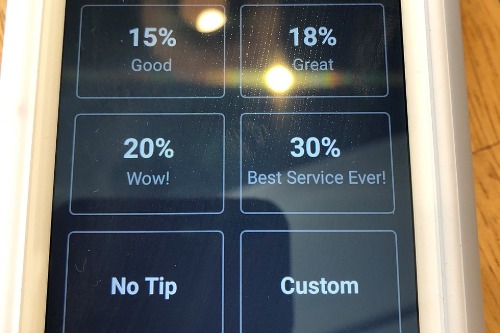1. Form a Line—Always

Whether it’s at the grocery store, the DMV, or a food truck, Americans instinctively form lines. There’s no need for signs or instructions—people just queue up. Cutting in line is one of the fastest ways to get dirty looks or even called out. It’s a deeply held belief in fairness and order.
This rule is so automatic that breaking it feels like a social crime. Even in chaotic settings, people will self-organize into a line. It’s not just about waiting—it’s about respecting everyone’s time. And yes, someone will absolutely say something if you skip ahead.
2. Always Tip—Even If the Service Was Just Okay

In America, tipping isn’t optional—it’s expected. Whether you’re at a restaurant, getting a haircut, or hailing a cab, leaving 15–20% is the norm. It’s not just about generosity—it’s how many service workers make a living. Even if the service wasn’t stellar, not tipping is seen as rude or disrespectful.
Most Americans follow this rule instinctively, even if they grumble about it. It’s so ingrained that forgetting to tip feels like a moral failure. Visitors from non-tipping cultures often get confused, but locals know: if there’s a bill, there’s a tip. No one teaches it—but everyone learns fast.
3. Smile at Strangers (But Don’t Talk Too Much)

In the U.S., smiling at people you pass on the street is a subtle social cue. It’s a way of saying “I see you” without starting a conversation. It’s friendly, noncommittal, and expected in most public settings. But go beyond that—like striking up a chat in an elevator—and you might get side-eyed.
Americans value friendliness, but also personal space. A smile is the perfect middle ground: warm, but not invasive. It’s a silent rule that keeps things pleasant without getting too personal. And if you don’t smile back? People will definitely notice.
4. Don’t Sit Next to Someone If Other Seats Are Open

In public spaces—buses, waiting rooms, movie theaters—Americans instinctively leave a buffer seat. Sitting right next to someone when there are other options feels intrusive. It’s not about being unfriendly—it’s about respecting personal space. That invisible “bubble” is sacred.
This rule isn’t written anywhere, but everyone knows it. If you break it, you’ll feel the awkward tension immediately. It’s a quiet agreement that helps people feel comfortable in shared spaces. And it’s one of the most universally followed social codes in the country.
5. Don’t Call Without Texting First

Phone calls used to be the norm, but now they’re borderline intrusive. Unless it’s urgent or scheduled, calling someone without a heads-up is often seen as inconsiderate. Most people prefer a quick “Hey, can I call you?” text first. It’s about respecting time and mental space.
This rule has evolved with technology, but it’s widely accepted. Cold calls feel jarring, especially when a text would do. It’s not that Americans hate talking—it’s that they like to be prepared. And if you ignore this rule, don’t be surprised if your call goes unanswered.
6. Don’t Talk Politics at the Dinner Table

Even in a politically charged country, there’s an unspoken rule: keep it light at social gatherings. Bringing up politics—especially in mixed company—is often seen as a buzzkill. It’s not about avoiding hard topics, but about preserving peace. Thanksgiving dinner is not the time for a debate.
Most Americans follow this rule out of habit or self-preservation. It’s easier to talk about sports, weather, or TV shows than risk a heated argument. The rule isn’t universal, but it’s widely understood. And when someone breaks it, you can feel the room shift.
7. Don’t Show Up Empty-Handed

If you’re invited to someone’s home—whether for dinner, a party, or a casual hangout—you bring something. A bottle of wine, a dessert, or even a six-pack is standard. Showing up empty-handed feels inconsiderate, even if the host says “just bring yourself.” It’s a gesture of appreciation.
This rule isn’t taught in school, but it’s learned quickly through experience. It’s not about the value of the gift—it’s about the thought. Americans love a good “host gift,” and it’s a small way to say thanks. Ignore it, and you might not get invited back.
8. Don’t Ask How Much Someone Makes

Money talk is taboo in most American circles. Asking someone their salary, rent, or how much they paid for something is considered nosy or rude. Even close friends often avoid these topics. It’s a cultural quirk rooted in privacy and individualism.
While other countries might be more open about finances, Americans tend to keep it vague. You can talk about work—but not your paycheck. It’s one of those invisible boundaries that everyone respects. And if you cross it, expect an awkward pause.
This post 8 Rules of American Life That No One Teaches—But Everyone Follows was first published on American Charm.


